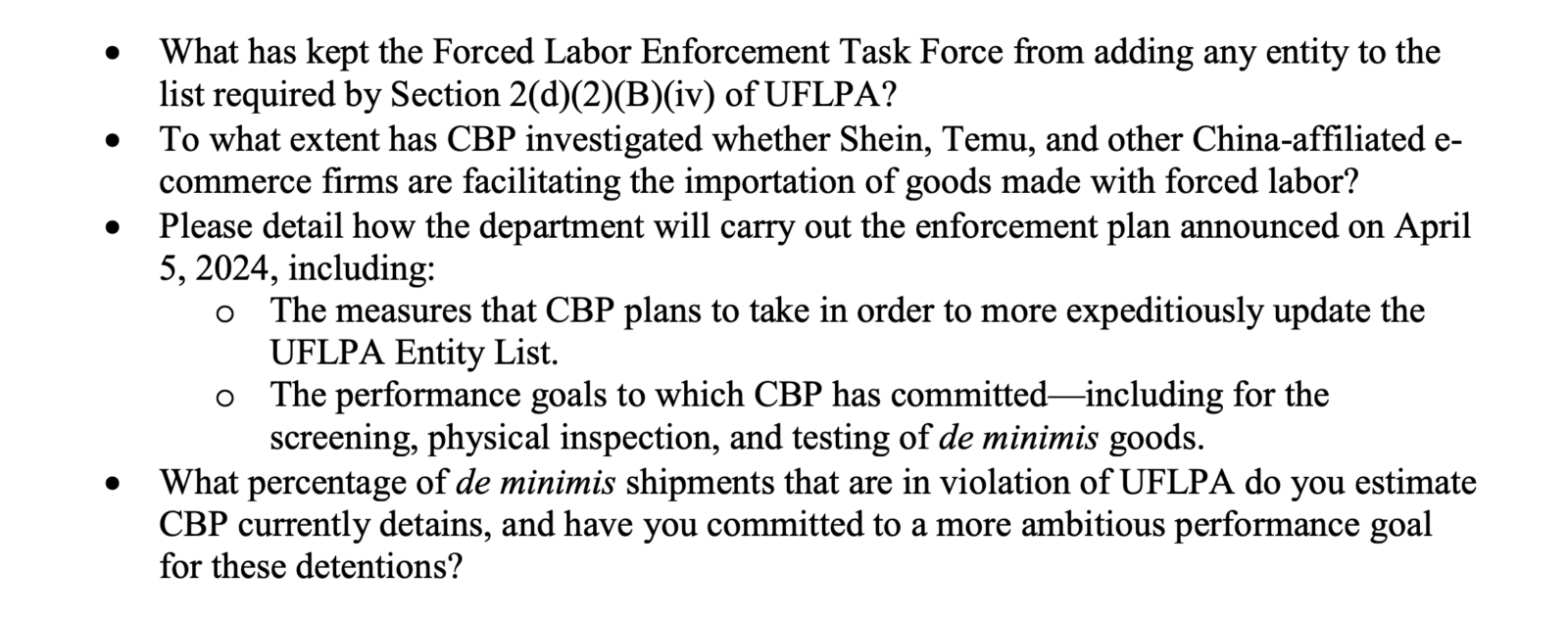Senator Marco Rubio said this week that he suspects that Shein and Temu are exporting goods to the United States made with Uyghur slave labor in violation of the Uyghur Forced Labor Prevention Act (“UFLPA”). In an April 16 letter to Department of Homeland Security (“DHS”) Secretary Alejandro Mayorkas, Sen. Rubio asks the DHS to investigate Shein and Temu (citing “compelling evidence” unearthed by private firms and journalists that suggests that the two ultra-fast fashion retailers are facilitating the entry of goods made with Uyghur forced labor) and add them to the UFLPA entity list if they are found to be in violation of the law.
Specifically, Sen. Rubio pointed to a November 2022 Bloomberg investigation that found that Shein garments were made with cotton from the Xinjiang Uyghur Autonomous Region (“XUAR”), as well as the findings of a “digital vetting platform,” which determined that Temu has offered for sale in the United States various items that were made or sold by businesses located in XUAR. At the same time, Rubio states that Temu, in particular, “lacks even a basic compliance or auditing system to ensure its products are compliant with UFLPA and has an unenforced code of conduct that prohibits the use of forced labor,” noting that the company “has admitted that it ‘does not expressly prohibit third-party sellers from selling products based on their origin in the XUAR.’”
> The UFLPA, which officially went into force in June 2022, creates a rebuttable presumption that any goods that were “mined, produced, or manufactured, wholly or in part, in the Xinjiang Uyghur Autonomous Region” were made using forced labor, and bars their importation into the U.S., unless the importer can produce documentation within 30 days that meets the “clear and convincing evidence” standard in order to qualify for an exception.
> According to Sen. Rubio, the UFLPA empowers CBP to block the importation of goods that originate in the XUAR or are made under “labor transfer” programs that send Uyghurs and other persecuted groups to other parts of China.
Given “the blatant exploitation of trade loopholes that Shein and Temu regularly demonstrate,” namely, their reliance on duty and tax-free importation for packages whose contents are valued at less than $800, and the “high probability these companies have facilitated the importation of goods made with forced labor,” Sen. Rubio urges Sec. Mayorkas to investigate Shein and Temu and add them to the exporter list under UFLPA’s Section 2(d)(2)(B)(iv) should they be in violation of federal law.
> Section 2(d)(2)(B)(iv) refers to entities that have exported products from China to the U.S. that were mined, produced, or manufactured wholly or in part by: (1) entities in the Xinjiang Uyghur Autonomous Region; or (2) entities working with the government of the Xinjiang Uyghur Autonomous Region to recruit, transport, transfer, harbor or receive forced labor or Uyghurs, Kazakhs, Kyrgyz, or members of other persecuted groups out of the Xinjiang Uyghur Autonomous Region.
Interestingly enough, while DHS has added companies to the official list of exporters acting in violation of the UFLPA, it does not currently have any entities listed under Section 2(d)(2)(B)(iv).

Against that background, Sen. Rubio has asked Sec. Mayorkas (in the aforementioned letter) to answer a number of questions by May 16. These include …

THE BIGGER PICTURE: Sen. Rubio’s letter comes amid increasing attention to the workings of companies like Shein and Temu and their effect on U.S. commerce. On March 6, for example, Sens. Bill Cassidy and Michael Bennet introduced the Americans Trade and Investment Act, which aims to “transform and unleash economic potential in the United States and Latin America through encouraging reshoring and nearshoring industry from China.” Part of the focus of the legislation is closing the de minimis loophole, which has been widely utilized by the likes of Shein and Temu.
More recently, DHS outlined an enhanced strategy to “combat illicit trade and level the playing field for the American textile industry,” and announced that it would work closely with CBP to “protect the integrity of our markets, hold perpetrators accountable for customs violations, and safeguard the American textile industry.” In particular, DHS said that its plan – presumably prompted in no small part by the growing presence of companies like Shein and Temu – will “serve as the blueprint for future strengthened enforcement efforts through intensified targeting of small package shipments; joint trade special operations; increased customs audits and foreign verifications; and the expansion of the UFLPA Entity List.”
All of these efforts follow from an earlier call from attorneys for various states for U.S. Securities and Exchange Commission chairman Gary Gensler “to require, as a condition of being listed on a U.S. based securities exchange, that any foreign-owned company certify via a truly independent process that it is compliant with Section 307 of the Tariff Act of 1930,” a federal law that prohibits companies from importing any product that was “mined, produced, or manufactured wholly or in part by forced labor, including forced or indentured child labor.”
A spokesperson for Shein told TFL, “SHEIN has a zero-tolerance policy for forced labor. We take visibility across our entire supply chain seriously, and we are committed to respecting human rights. To comply with U.S. law, we require our contract manufacturers to only source cotton from approved regions.”
A rep for Temu did not immediately reply to a request for comment.